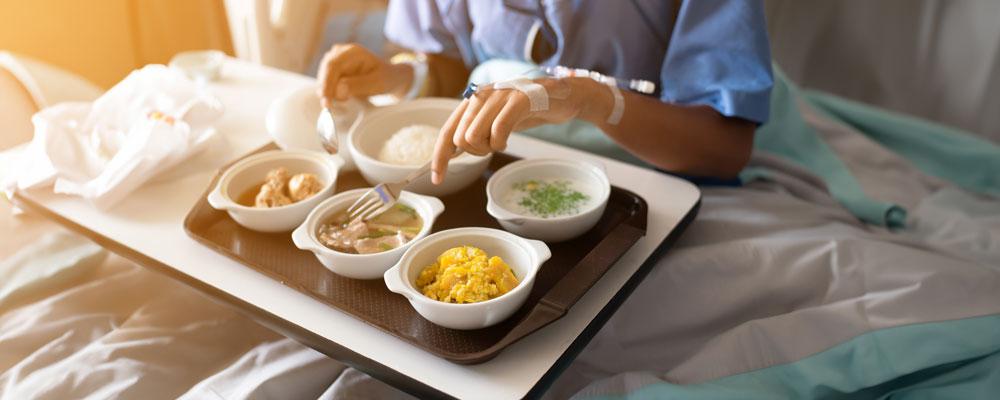NHS England has announced that sugary drinks will be banned from sale across NHS hospitals in England from July. In our first Top 10 list of 2018, HB examines the NHS trusts and health organisations that are excelling in healthy catering
NHS England has reported that around £16 billion a year is spent on the direct medical costs of diabetes and conditions related to being overweight or obese. With a large percentage of hospitals not meeting government food standards and struggling to serve and sell freshly prepared, healthy and ethically sourced food for patients, staff and hospital visitors, the issue of healthy eating in hospitals themselves has come under inspection.
With vending machines in the UK selling over 13 million food and drink items everyday – equating to 93 million a week – NHS England chief executive Simon Stevens has strongly voiced his concerns over the need to fight obesity, diabetes and tooth decay within NHS premises. At the start of October 2017, Stevens warned that sweet and chocolates sold in hospitals should be 250 calories and under
Just this month it was announced that sugary drinks will be banned from sale across NHS hospitals in England from July. With retailers including Marks & Spencer, WHSmiths and Subway having already agreed to cut sales of sweet drinks to 10 per cent of their output, NHS England has now released an updated contract for hospitals, which, for the first time, includes a clause prohibiting the sale of sweetened beverages, meaning the aforementioned retailers, and any others operating on hospital premises, will have to stop selling sugary drinks altogether.
Additionally, the new rules will also heavily restrict the sale of any high calorie foods. From next April, 60 per cent of sandwiches and pre-packed meals on sale in hospitals must contain a maximum of 400 calories per serving - rising to 75 per cent of cases a year later. And 60 per cent of sweets and chocolates sold must not exceed 250 calories - rising to 80 per cent by 2019.
Discussing the announcement, Katherine Button of the Campaign for Better Hospital food Coordinator, said: “We welcome this move by NHS England to ban the sale of sugary drinks in our hospitals. Tooth extraction as a result of tooth decay is the most common cause for hospitalisation of children under five – putting unnecessary pressure on stretched NHS services. This bold leadership from NHS England Chief Executive Simon Stevens is exactly what we need to tackle these big health challenges.”
In preparation of the new rules being enforced, Health Business takes a look at the hospital trusts leading the push for healthier meals on wards, whether that be sugar-free, locally sourced or with limited food waste and packaging. Congratulations to those included!
1- The Hillingdon Hospitals NHS Foundation Trust
A charity initiative to subsidise the food for parents of children with life-threatening or life-limiting illnesses was launched in 2017. The scheme offers a daily £5 voucher for a meal for families to have at their child’s bedside. In April last year, the trust’s food was praised by Great British Bake Off judge Prue Leith, who said that the trust ‘should be proud of the freshness, range and quality of the meals and snacks it provides not just to patients but also staff and visitors’.
Meanwhile the Soil Association’s ‘Food for Life’ team assisted the trust with its food specification with the recent appointment of a patients meal supplier. Such work saw Hillingdon Hospitals NHS Foundation Trust win the Hospital catering Award at the 2017 Health Business Awards.
All adult patients admitted to the Hillingdon Hospitals NHS Foundation Trust will be screened for malnutrition within 24 hours of admission to hospital and weekly thereafter to ensure patients receive the appropriate nutritional care plan during their inpatient stay.
Steve Wedgwood, interim director of Strategic Estate Development and Asset Management, said: “It’s very gratifying for the trust to be recognised in such a way as being a leader in London in terms of meeting hospital food standards, providing good patient meal satisfaction and having a good food ‘culture’. It also complements the recent work the trust has been carrying out in partnership with the Soil Association and it’s ‘Food for Life’ programme to review and develop our Food and Drink Strategy and transform the food experience for our patients, staff and visitors.”
2 - Taunton & Somerset NHS Foundation Trust
Musgrove Park has been developing best practice initiatives in areas such as food waste reduction, and making cost savings of £120,000 per year without any loss in food quality. Moving to a same day system and working closely with its catering provider, housekeeping team and ward nurses, food waste was reduced from 21 per cent to five per cent through effective monitoring of patients’ needs and bed turnover. A new food folder provides housekeeping staff on each ward with a greater clarity on the meals offered.
Taunton & Somerset NHS Trust were the recipients of a Health Business Award in 2016 for their catering department, recognising how Musgrove’s food service was rated 93 per cent for food in NHS England’s annual patient-led assessments of the care environment, which put the hospital top in the South West.
Linking with the Healthy Food Company, the hospital is now offering a new range of healthier meals on the children’s wards menus, providing the perfect balance of carbohydrates, protein and good fats for children to support them in their development. The hospital has also committed to working closely with all food and drink outlets on site to make sure they continue to promote healthy nutritional choices, including strongly encouraging the sale of non-sugary drinks at Musgrove Park Hospital and not allowing advertisements or promotions of sugary drinks.
Hayley Peters, executive director of patient care at Musgrove Park Hospital, said: “This award really is a testament to all the hard work done by staff across the hospital to make sure our patients get the best possible food and drink served to them. Here at Musgrove we have created a culture of catering being everyone’s responsibility, as we know that if we get it right it goes a long way to helping patients’ recovery. Along with the improvements we have made to the way our catering operates, we have also made significant cost savings, which has been reinvested back into patient care at the hospital.”
3 - Sheffield Teaching Hospitals NHS Foundation Trust
Sheffield Teaching Hospitals NHS Foundation Trust, who recently won a Health Service Journal Award in recognition of its pioneering work to provide nutritious, healthy and sustainably sourced food to patients, produces and delivers 40,000 meals to patients and staff across six hospital and community sites.
As well as achieving the Soil Association Food for Life Served Here Silver Award, the trust is one of the first NHS hospital sites in the UK to pilot and achieve a new Green Kitchen Standard - run by the Soil Association and the Carbon Trust. Sheffield Teaching Hospitals NHS Foundation Trust now produces over 75 per cent of its meals from scratch, reducing waste and packaging.
Additionally, 50 newly trained healthy eating and sustainability champions were given extra training to drive change in working practices and promote the benefits of healthy eating, waste reduction and recycling.
Emma Wilson, head of catering for the trust, said: “We’re enormously proud to have won this prestigious award. We are continually working to achieve best practices in all that we do, including providing healthy, high quality food at good cost for our patients and staff and supporting the NHS carbon reduction strategy. Achieving the Food for Life Silver Award and the Green Kitchen Standard has enabled us to completely revisit change in our working practices, which is all the more remarkable when we are one of the largest NHS trusts in the country. Not only has this improved patient satisfaction scores but will inevitably have a wider environmental impact on the community which we serve.”
4 - North Bristol NHS Trust
North Bristol NHS Trust collected the top prize in the Food Award category at the 2015 NHS Sustainability Awards in recognition for the significant steps the organisation has taken to source local, seasonal, organic and fairly traded food.
As part of this initiative, the trust, which was the first NHS organisation to be awarded a silver catering mark from the Soil Association, now sources all milk from a local dairy farm in Wellington, Somerset, all meat from a local butcher and all eggs are free range. Additionally, the trust’s catering team operate winter and summer menus to make the most of seasonal produce and reduce food miles.
Gary Wilkins, head of catering at North Bristol NHS Trust, said: “The Catering Mark is something tangible to show patients, visitors and other interested parties just how important providing improved patient meals is for us here at North Bristol NHS Trust. But it’s not just the patients that benefit, we feel we are really contributing to the local economy and feeding back into our community.”

5 - Hinchingbrooke Hospital
The catering team at Hinchingbrooke Hospital won catering award at the 2015 Health Business Awards for the ‘high quality and nutritional value of its meals’.
Driving towards the use of fresh ingredients in its meals, the meat used in hospital meals is from red tractor farms, milk and eggs are organic and all fish is Marine Steward Certified (MSC), with 80 per cent of ingredients sourced from local suppliers.
In June 2016, the Garden Restaurant, located on the first floor of the main hospital building, became the first and only in-house NHS service to be awarded the Gold Catering Mark from the Soil Association for the standard and quality of its food. Offering a varied selection of nutritious, freshly prepared food at great value, the organisation prides itself on using only high quality fresh ingredients.
Hospital chief executive Lance McCarthy said: “We were delighted to win the hospital catering award at this year’s Health Business Awards. Good nutrition plays a vital role in a patient’s recovery. Our catering team really understand the importance of good nutrition and are committed to providing the best quality produce to help improve patient and staff well-being. In the last year we have seen patient satisfaction levels rise to more than 96 per cent. This is a result of the team’s determination to provide our patients with high-quality, healthy food that meets their nutritional needs.”
6 - Tameside Hospital
Tameside hospital in Manchester has become the first in Britain to ban sugar from its restaurant in an effort to tackle growing concerns about obesity among NHS staff.
The hospital has removed all added sugar from the meals it prepares for visitors and health service workers, and taken sugary snacks and fizzy drinks off its menu. The only drinks now available are tea, coffee, milk and water. Campaigners have welcomed the move and are urging other hospitals to follow in Tameside’s footsteps.
Tameside hospital introduced its ban after an NHS England consultation in November last year found widespread support for a ban on sugary drinks in hospitals and clinics. A successful trial in which 100 staff members signed up for a weight loss scheme also catalysed the move. By following the clinically proven Slimpod programme, they reduced their portion sizes, ate healthier foods and lost weight. The most successful person on the study lost 13.1kg over the 12 weeks, and one who had been chronically diabetic now has the condition under control.
Karen James, chief executive of the hospital, said: “The Slimpod programme gently retrains the brain to change how people think and feel about food, enabling them to instinctively choose to eat better, want to eat less and enjoy moving more. As a result of the programme, many of my staff say their behaviour towards food has changed. Snacking has dramatically reduced, and for many it has stopped completely. They say they are sleeping better and are feeling less anxious and stress at work, which can only have a positive effect on the patients.”
7 - University Hospitals of North Midlands NHS Trust
In 2015, County Hospital in Stafford became only the third hospital in the country to be awarded the Gold Food for Life Catering Mark by the Soil Association for serving fresh and healthy meals, an accolade that also saw the catering team at the hospital win a Green Award from Stafford Borough Council for local food procurement.
However, not content with just winning the award, University Hospitals of North Midlands NHS Trust then invested £2 million in the kitchens at County Hospital, modernising kitchen facilities and allowing for the provision of locally-sourced produce and greater choice for patients, as well as cutting food waste.
Rob Willatt, Catering Manager at County Hospital, said: “The team have been working to increase the amount of good, quality food we source from local suppliers and these awards are fantastic recognition for that work. It is important that the Trust provides sustainable and nutritious food for its patients as well as supporting local businesses in Staffordshire. By replacing current suppliers in favour of local food producers, this improves the economic, social and environmental well-being of the area. It has also allowed us to update the patient menu to provide our patients with more choice than ever before.”
8 - Guy’s and St Thomas’ NHS Foundation Trust
The Soil Association’s Food for Life Catering Mark bronze award recognises Guy’s and St Thomas’ progress towards preparing sustainable food for patients which is ethically sourced and meets nutritional guidelines, which also contributes to the lowering of food waste recycling.
The trust’s Nutritional Care Strategy, launched in 2016, helps staff prevent malnutrition in vulnerable patients, provides safe specialist nutrition where required and encourages patients, staff and visitors to choose healthier food options. In June, inpatient feedback showed significant improvement in hospital food choice, help from staff to eat meals and quality of food on offer.
Robert Cormack, group catering manager at Guy’s and St Thomas’, says: “We are one of the few remaining hospitals making all our food freshly in our kitchen on site – the Catering Mark is the perfect tool to help us take our food to the next level, so we’re delighted to receive it.
“We already work closely with clinical staff to ensure that food is as much a part of a patient’s recovery as their treatment. This award is the perfect incentive for improving patient food even further – for example, we have taken out all additives, trans-fats and things that aren’t good for patients. Our strategy will help us keep firmly on track. It’s the simple little things that make the patient experience that little bit better.”

9 - East Kent Hospitals University NHS Foundation Trust
Working in collaboration with Serco, East Kent Hospitals University NHS Foundation Trust serves up over 1,000 main meals each day to patients across the trust’s three main sites in Ashford, Canterbury and Margate.
Since 2012, the trust has offered a finger food platter menu for patients with advanced dementia who are less dextrous and may struggle to use cutlery, as well as a picture menu to make it easier for those with communications difficulties to understand and chose their meals, drinks and snacks.
Consequently, the inaugural Hospital Caterers’ Association (HCA) ‘6Cs Award’ was awarded for the professional collaboration between Serco and the NHS’s own clinical and dietetic teams to improve the standard of patient catering.
Furthermore, almost three in four inpatients consider hospital food to be very good or good (72 per cent) while patient satisfaction levels for hospital food reached 93 per cent in 2016, up from 82 per cent, according to a separate monthly survey of hospital inpatients by Serco, who provide the food.
Wendy-Ling Relph, trust Matron for Nutrition & Quality Improvement, said: “Over the last four years, the trust and Serco have worked closely together developing our patient catering services. We are delighted to have our efforts recognised with this prestigious award. The national judging panel were so impressed that they plan to visit East Kent in order to share our innovations and commitment with other hospitals across the country.”
10 - Blackpool Teaching Hospitals NHS Foundation Trust
Catering staff at Blackpool Victoria Hospital were awarded a five star food rating for the seventh successive year in June last year. Environmental Health inspectors from Blackpool Council checked the kitchens, food preparation and cooking, food hygiene systems and temperature records.
Staff at the trust also use Nutrition and Hydration Week to highlight, promote and celebrate improvements in the provision of nutrition and hydration locally, with the catering department named the organisation’s Clinical Team of the Year in the internal Celebrating Success Awards.
Yvonne Widdows, senior site services manager for Blackpool Teaching Hospitals NHS Foundation Trust, said: “This award is a real achievement when you think about the amount of food we produce here every day, but it’s important to us that we stay on top of our food safety requirements all the time.
“Patients, visitors and staff can continue to have confidence in the standards of catering services they are receiving and that we produce food in a safe manner. We know how important meals are to our patients and it can often be the highlight of their day. “I’d like to say thank you to the team for all their hard work; it really is a team effort to achieve these results.”





